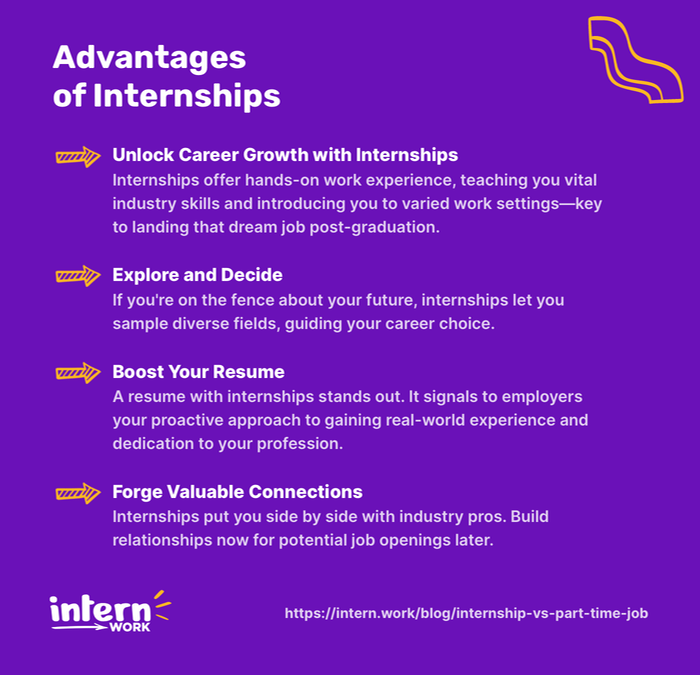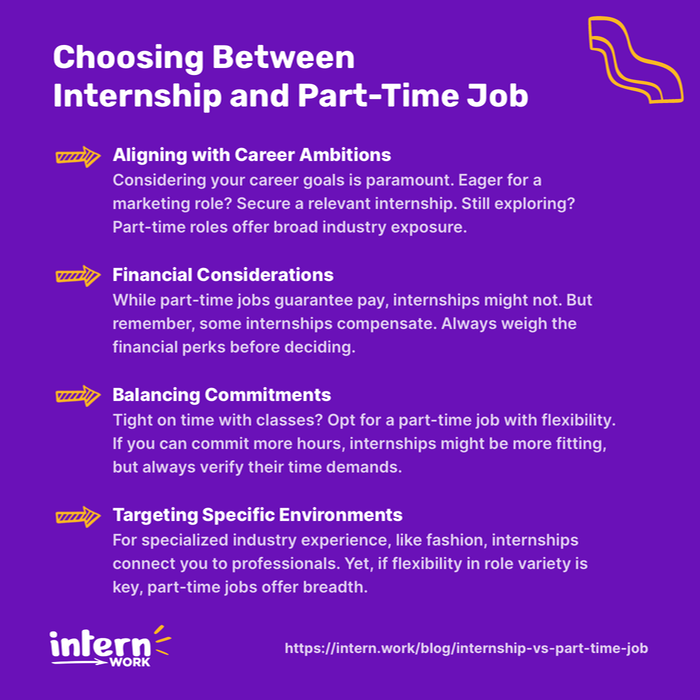
Are you a student looking to build valuable work experience? Do you need to earn money while studying? Both internships and part-time jobs can offer you a range of benefits, but which one is best for you? Let’s dive into the pros and cons of both options so that you can make an informed decision.
Understanding Internships and Part-Time Jobs
Internships and part-time jobs are two great ways for students to gain valuable work experience, earn money, and develop skills that will help them in their future careers. In this article, we’ll take a closer look at what internships and part-time jobs are, their benefits, and how to find them.
What is an Internship?
An internship is a temporary work placement that is designed to provide you with exposure to a specific industry or area of work. Internships are typically offered by companies or organizations and can be found in a wide range of industries, including finance, marketing, healthcare, and technology.
Internships can be paid or unpaid, and their duration can vary from a few weeks to several months. They are an excellent way for students to gain hands-on experience in their field of study, understand the dynamics of the workplace, and network with industry professionals.
During an internship, you’ll work alongside experienced professionals who will guide you and help you develop your skills. You’ll also have the opportunity to apply the knowledge you’ve gained in the classroom to real-life situations. This experience can be invaluable when it comes to landing a job after graduation, as many employers look for candidates with practical experience.
What is a Part-Time Job?
A part-time job is a paid position that involves working for fewer hours than a full-time job. Part-time jobs can be found in various industries and can range from entry-level roles to skilled positions.
Part-time jobs offer flexibility in terms of work hours, as they typically allow you to work around your class schedule. They can also be a great way to earn money while you study, which can help you pay for tuition, textbooks, and other expenses.
Part-time jobs can also provide you with valuable work experience, which can help you develop skills that are transferable to other jobs. For example, working as a customer service representative can help you develop communication and problem-solving skills that are useful in many different industries.
How to Find Internships and Part-Time Jobs
There are many ways to find internships and part-time jobs. One of the best ways is to check with your school’s career center. They often have listings of available internships and part-time jobs that are specifically tailored to students.
You can also search online job boards, such as intern.work, for internships in your area. Another option is to network with professionals in your field of study. Attend industry events and conferences, and connect with people on LinkedIn.
When applying for internships and part-time jobs, make sure to tailor your resume and cover letter to the specific position you’re applying for. Highlight your relevant skills and experience, and explain why you’re interested in the position.
Internships and part-time jobs are excellent ways for students to gain valuable work experience, earn money, and develop skills that will help them in their future careers. By taking advantage of these opportunities, you can set yourself up for success in your chosen field.
Internships and part-time jobs offer valuable work experience and flexibility for students. They provide exposure to industries, help with expenses, and develop skills for future success.
Pros and Cons of Internships
Internships have become an increasingly popular option for students and recent graduates who are looking to gain practical experience in their chosen field. While there are many advantages to internships, there are also some disadvantages that should be considered before embarking on an internship program.
Advantages of Internships
One of the biggest advantages of internships is the opportunity to gain valuable work experience. Through internships, you can learn industry-specific skills, develop professional networks, and gain exposure to different work environments. This experience can be invaluable when it comes to securing a full-time job after graduation.
Internships can also provide an opportunity to explore different career paths and industries. If you are unsure about what you want to do after graduation, an internship can give you a taste of different industries and help you make an informed decision about your career path.
In addition, internships can help you build your resume and make you a more attractive job candidate. Employers are often impressed by candidates who have completed internships, as it shows that they have taken the initiative to gain practical experience and are committed to their chosen field.
Finally, internships can be a great way to make connections in your chosen industry. By working alongside professionals in the field, you can develop relationships that may lead to job opportunities in the future.
Disadvantages of Internships
While internships undoubtedly offer a wide range of advantages, it’s important to approach them with a balanced perspective that considers potential challenges as well. By being aware of these factors, you can make informed decisions and navigate any potential drawbacks with grace.
One aspect to consider is that internships, particularly in certain industries, may be unpaid or offer minimal compensation. This can pose a challenge for students who need to support themselves financially while pursuing their studies. It’s essential to evaluate your financial situation and determine if an unpaid or low-paying internship is feasible for you, considering your personal circumstances and responsibilities.
Additionally, securing an internship placement can sometimes be a competitive and time-consuming process. The high demand for internships may require significant effort in researching opportunities, crafting compelling applications, and undergoing rigorous selection processes. This can be particularly challenging for students already balancing a full course load and other commitments. However, by staying proactive, persistent, and utilizing resources such as career services, you can increase your chances of securing a valuable internship opportunity.
Furthermore, it’s worth noting that internships occasionally involve tasks that may be perceived as menial or less directly related to your desired field. Administrative duties and errands, though not always glamorous, can still contribute to your overall professional development. These tasks often provide an opportunity to cultivate important skills like time management, organization, and attention to detail. Embracing these responsibilities with a positive attitude and recognizing their value can enhance your learning experience.
Internships offer numerous advantages, including practical experience, resume-building opportunities, and industry connections. However, it’s crucial to be mindful of potential challenges such as financial considerations, competitiveness, and the nature of assigned tasks. By approaching these disadvantages with a proactive mindset and considering how they fit into your overall career goals, you can maximize the benefits of internships while effectively managing any obstacles along the way.

Internships offer valuable work experience and networking opportunities, but it’s essential to consider potential challenges. Advantages include gaining skills, exploring careers, enhancing your resume, and making connections. However, internships may be unpaid, competitive, and involve diverse tasks.
Pros and Cons of Part-Time Jobs
Exploring part-time job opportunities can be a pivotal decision, offering a unique set of advantages and challenges. Whether you’re a student juggling academics or an individual seeking flexibility in your work schedule, part-time jobs can provide valuable experiences, financial independence, and a chance to develop essential skills. However, it’s crucial to weigh the pros and cons before embarking on this path. In this section, we will delve into the various benefits and drawbacks of part-time jobs, allowing you to make an informed decision that aligns with your goals and lifestyle. By understanding the potential advantages and disadvantages, you can navigate the world of part-time employment with confidence and clarity.
Advantages of Part-Time Jobs
A significant advantage of part-time jobs is that they offer flexible work hours, which can be ideal for students who need to balance their work and class schedules. This flexibility allows students to work around their class schedules and other commitments, such as extracurricular activities and social events. Additionally, part-time jobs can provide a way to earn money while studying, which can help you support yourself financially and reduce the amount of student debt you may accumulate.
Another advantage of part-time jobs is that they can help you develop transferable skills that can be valuable in any future career. For example, a part-time job in a retail store can help you improve your customer service skills, communication skills, and teamwork skills. These skills can be applied to a variety of different industries and can make you a more attractive candidate to potential employers.
Part-time jobs can also provide an opportunity to explore different industries and job roles. By working part-time in different industries, you can gain exposure to different career paths and determine which ones interest you the most. This can help you make more informed decisions about your future career goals and aspirations.
Disadvantages of Part-Time Jobs
One of the major disadvantages of part-time jobs is that they may not always be related to your desired career path. In some cases, part-time jobs may not offer relevant work experience that can help you build skills and professional connections in your intended career field. This can make it more difficult to secure a job in your desired industry after graduation.
Another disadvantage of part-time jobs is that they may not always pay as well as internships. Part-time job salaries can vary depending on the industry and role, and they may not always offer the same level of compensation as internships. This can make it more difficult to save money or pay for expenses, such as rent, utilities, and groceries.
Finally, part-time jobs may not always provide the same level of job security as full-time positions. Because part-time jobs are often temporary or seasonal, they may not offer the same level of stability and benefits as full-time positions. This can make it more difficult to plan for the future and achieve long-term financial goals.
While part-time jobs offer many advantages, they also have their fair share of disadvantages. It’s important to carefully consider your personal and professional goals before accepting a part-time job and to weigh the pros and cons before making a decision.

Part-time jobs offer flexibility and skill development but have drawbacks. They provide flexible hours, earning opportunities, and transferable skills. However, they may not align with desired careers, have lower pay, and lack job security. Consider goals and trade-offs before pursuing a part-time job.
Choosing Between Internship and Part-Time Job: Key Factors to Consider
When faced with the decision of whether to pursue an internship or a part-time job, it’s essential to carefully consider the key factors that can influence your choice. Both options have their own unique advantages and considerations, and understanding these factors is crucial to make an informed decision that aligns with your goals and aspirations. We will explore the significant aspects that you should take into account when choosing between an internship and a part-time job.
By examining factors such as professional experience, skill development, financial considerations, and long-term career prospects, you will gain the insights needed to navigate this decision-making process effectively. Whether you’re a student seeking real-world exposure or an individual looking to enhance your skills, this section will guide you towards making a choice that best suits your individual circumstances and ambitions.
Your Career Goals
The first factor to consider when choosing between an internship and a part-time job is your career goals. It’s important to think about where you want to be in the future and what type of experience will help you get there. For example, if you are interested in a career in marketing, an internship with a marketing firm will give you the opportunity to work with professionals in the field and gain hands-on experience. On the other hand, if you are unsure about your career path, a part-time job may allow you to explore different industries and roles to help you make a decision.
Your Financial Situation
If you need to earn money while studying, then a part-time job may be the best option for you. While internships can provide valuable work experience, they may not always offer compensation, which can be challenging for students who need to cover their expenses. However, some internships do offer stipends or hourly pay, so it’s important to research and compare compensation packages before making a decision.
Your Schedule and Availability
When deciding between an internship and a part-time job, it’s important to consider your schedule and availability. If you have a packed class schedule and do not have much availability during the week, then a part-time job with flexible hours may be your best bet. However, if you have more free time and are willing to dedicate a significant amount of time to a placement, then an internship may be a better option. Some internships require a certain number of hours per week, so make sure to check the requirements before applying.
Your Desired Work Environment
If you are looking for a specific work environment or industry, then an internship may be a better option. Internships provide a unique opportunity to gain experience in specific industries and roles and network with professionals. For example, if you are interested in working in the fashion industry, an internship with a fashion company will give you the chance to work with designers, stylists, and other industry professionals. However, if you are looking for a job that allows you to work in any industry, then a part-time job may offer you more flexibility in terms of available roles.
Ultimately, the decision between an internship and a part-time job depends on your individual needs and goals. It’s important to weigh the pros and cons of each option and consider how they fit into your overall career plan. Whichever option you choose, make the most of the experience and use it as an opportunity to learn, grow, and develop new skills.

Consider your career goals, financial situation, schedule, and desired work environment when choosing between an internship and a part-time job. Internships offer industry experience and networking, while part-time jobs provide flexibility and income.
How to Find the Right Internship or Part-Time Job
Are you eager to gain valuable work experience and develop essential skills while still pursuing your education? The quest for the perfect internship or part-time job can be an exciting yet daunting endeavor. Whether you’re a student seeking real-world exposure or an individual looking to explore a new field, finding the right opportunity can set the stage for your future career.
We will guide you through the process of discovering the ideal internship or part-time job that aligns with your goals, interests, and aspirations. From researching industries to leveraging your network, we will provide you with practical tips and strategies to navigate this important step in your professional journey.
Networking and Job Search Strategies
Networking is an essential part of finding both internships and part-time jobs. Make sure to reach out to your professors, alumni, and career services office to learn about opportunities in your field. Attend job fairs and networking events and ask for advice from professionals in your desired industry.
You can also use job search websites and internship job boards to find relevant internships and part-time jobs. Make sure to upload an up-to-date CV or resume and apply to various positions to increase your chances of securing a placement or role.
Preparing a Strong Application
Make sure to tailor your CV and cover letter to the specific role or placement you are applying for. Highlight your relevant skills and experience and demonstrate your enthusiasm for the job or internship. Make sure to proofread your application materials carefully to avoid any grammatical or spelling errors.
Acing the Interview Process
Once you have been invited to an interview, make sure to prepare thoroughly. Research the company or organization and come prepared with a few questions for your interviewer. Dress professionally, arrive on time, and make a great first impression. Remember to be confident and showcase your skills and experience throughout the interview.
Network, utilize job search platforms, and attend events to find internships and part-time jobs. Tailor your application materials to each opportunity, emphasizing relevant skills and experience. Prepare for interviews by researching the company, dressing professionally, and showcasing your abilities with confidence.
Key Takeaways
- Internships offer valuable work experience, exposure to specific industries, and the opportunity to network with professionals in the field. They can help you gain practical skills and make you a more attractive job candidate after graduation.
- Part-time jobs provide flexibility in terms of work hours, allowing you to balance work and studies. They can help you earn money while studying and develop transferable skills that are valuable in any career.
- To find internships and part-time jobs, utilize resources such as your school's career center, online job boards, and professional networking events. Tailor your application materials to each position and prepare for interviews by researching the company and practicing your interview skills.
- Internships offer advantages such as valuable work experience, resume-building opportunities, and industry connections. However, they may also have disadvantages like potential financial challenges and competitive application processes.
- Part-time jobs offer advantages such as flexibility in scheduling, earning money while studying, and developing transferable skills. However, they may not always provide relevant work experience and may have limitations in terms of job security and benefits.
- Consider factors such as your career goals, financial situation, schedule and availability, and desired work environment when deciding between an internship and a part-time job.
- Networking, tailoring your application materials, and preparing for interviews are important steps in finding the right internship or part-time job. Utilize online job boards, career services, and professional connections to enhance your job search efforts.
Wrapping Up
Both internships and part-time jobs can offer you valuable work experience and help you earn money while studying. The decision to choose between an internship and a part-time job should be based on your career goals, financial situation, availability, and desired work environment. With the right networking, job search strategies, and interview preparation, you can secure a great internship or part-time job that will help you kickstart your career success.





